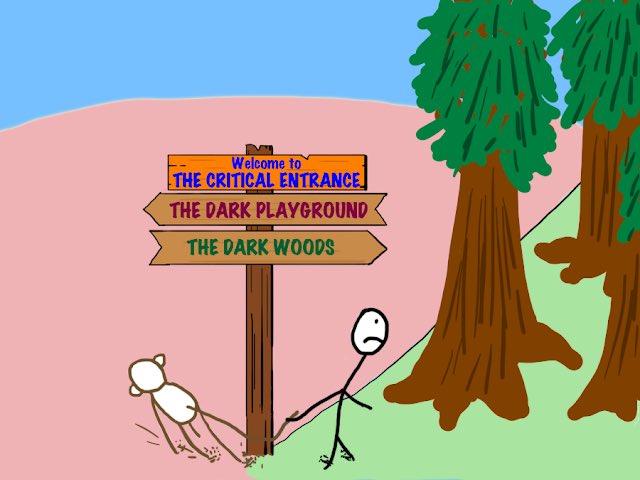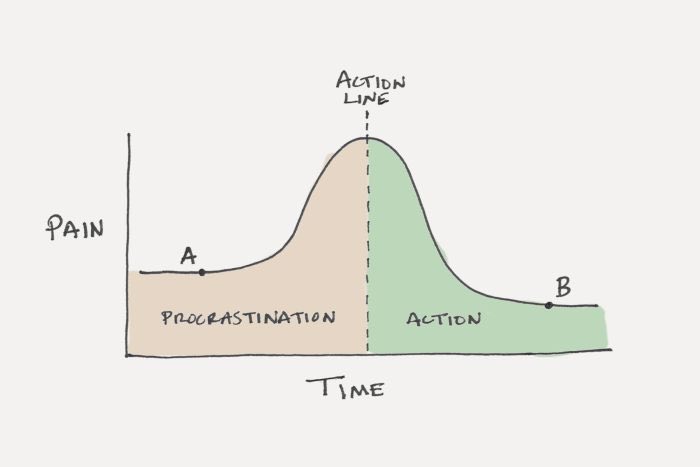Thread
How to stop procrastinating:
Confession: I spent most of my life as a chronic procrastinator.
I also spent most of my life justifying that chronic procrastination—both internally and externally.
I told myself it was "just how I worked”—that the pressure of an imminent deadline was what I needed to thrive.
I also spent most of my life justifying that chronic procrastination—both internally and externally.
I told myself it was "just how I worked”—that the pressure of an imminent deadline was what I needed to thrive.
To be fair, I wasn't wildly off:
The Yerkes-Dodson Law says pressure and performance are positively correlated—up to a point, after which more pressure reduces performance.
The real issue: procrastination meant I only worked on the urgent—very rarely the long-term important.
The Yerkes-Dodson Law says pressure and performance are positively correlated—up to a point, after which more pressure reduces performance.
The real issue: procrastination meant I only worked on the urgent—very rarely the long-term important.
Fortunately, I've learned how to fight back and get important s*** done.
This thread shares my framework for how to stop procrastinating.
It involves five core steps:
(1) Awareness
(2) Deconstruction
(3) Plan Creation
(4) Stake Creation
(5) Action
Let's walk through each...
This thread shares my framework for how to stop procrastinating.
It involves five core steps:
(1) Awareness
(2) Deconstruction
(3) Plan Creation
(4) Stake Creation
(5) Action
Let's walk through each...
Awareness
As with most mental hurdles, the first step is becoming aware of the problem.
Procrastination is defined as the action of postponing or delaying something.
It's not new.
Ancient Greek philosophers called it Akrasia—acting against your better judgement.
As with most mental hurdles, the first step is becoming aware of the problem.
Procrastination is defined as the action of postponing or delaying something.
It's not new.
Ancient Greek philosophers called it Akrasia—acting against your better judgement.
We procrastinate when it's easier to delegate a task to our future self.
I categorize procrastination-prone tasks into two types:
Type I: Big & Scary
Type II: Small & Boring
Type I is the most damning.
These tend to be the long-term important projects—the growth creators.
I categorize procrastination-prone tasks into two types:
Type I: Big & Scary
Type II: Small & Boring
Type I is the most damning.
These tend to be the long-term important projects—the growth creators.
Schedule a daily assessment of your day-to-day actions.
Ask a few questions:
Am I proud of the actions I am taking on these big projects? Am I doing what I should be doing?
If the answers are “no”—great! You're aware of your procrastination and can proceed to the next step...
Ask a few questions:
Am I proud of the actions I am taking on these big projects? Am I doing what I should be doing?
If the answers are “no”—great! You're aware of your procrastination and can proceed to the next step...
Deconstruction
The driver of Type I procrastination is that big & scary projects are...well...big & scary.
In his famous Ted Talk, @waitbutwhy uses the example of a senior thesis.
If you define the project as "write my 100-page thesis" you are pre-wired for procrastination.
The driver of Type I procrastination is that big & scary projects are...well...big & scary.
In his famous Ted Talk, @waitbutwhy uses the example of a senior thesis.
If you define the project as "write my 100-page thesis" you are pre-wired for procrastination.
To the chronic procrastinator, large, long-term projects look like a big, black box.
Our imaginations fill that box with endless complexity and horror.
We know it's important, but it's too intimidating as a whole.
So get out your hammer and chisel and break that thing down...
Our imaginations fill that box with endless complexity and horror.
We know it's important, but it's too intimidating as a whole.
So get out your hammer and chisel and break that thing down...
It's critical to deconstruct the big and scary project into small and incremental tasks.
In the example of the senior thesis, the tasks might be:
• Gather important research
• Annotate key pieces
• Craft thesis outline
• Etc.
The Goal: Convert intimidating into manageable.
In the example of the senior thesis, the tasks might be:
• Gather important research
• Annotate key pieces
• Craft thesis outline
• Etc.
The Goal: Convert intimidating into manageable.
Plan Creation
Now you need a plan of attack.
The plan should be:
• Specific—exactly what you'll do
• Time Bound—when you'll do it
Important: We tend to overestimate what we can do in a day—lean towards less ambitious time bounds to give yourself easy wins early.
Now you need a plan of attack.
The plan should be:
• Specific—exactly what you'll do
• Time Bound—when you'll do it
Important: We tend to overestimate what we can do in a day—lean towards less ambitious time bounds to give yourself easy wins early.
I find it helpful to create a project document.
Write down the specific tasks under each major deconstructed pillar of the project.
Write down your timeline for starting and completing each.
Once complete, hide the future pillars to avoid intimidation.
Focus on the present.
Write down the specific tasks under each major deconstructed pillar of the project.
Write down your timeline for starting and completing each.
Once complete, hide the future pillars to avoid intimidation.
Focus on the present.
Stake Creation
This is perhaps the most important—and most overlooked—step of the framework.
You can create—and raise—stakes as a means to driving better outcomes.
A few ideas:
• Public declaration
• Social pressure
• Reward or penalty
Notes on each...
This is perhaps the most important—and most overlooked—step of the framework.
You can create—and raise—stakes as a means to driving better outcomes.
A few ideas:
• Public declaration
• Social pressure
• Reward or penalty
Notes on each...
Public Declaration: State your intentions publicly. It makes it harder to flake!
Social Pressure: Plan to meet a friend somewhere to do the initial work.
Reward or Penalty: Plan a reward or penalty if you do/don't do what you're supposed to.
Mental games can be very effective!
Social Pressure: Plan to meet a friend somewhere to do the initial work.
Reward or Penalty: Plan a reward or penalty if you do/don't do what you're supposed to.
Mental games can be very effective!
Action
Action is the hardest part—specifically the first action, the first motion.
But remember: a body in motion tends to stay in motion.
@waitbutwhy calls it the Dark Woods vs. Dark Playground Decision.
@JamesClear calls it the Procrastination-Action Line.
It's important!
Action is the hardest part—specifically the first action, the first motion.
But remember: a body in motion tends to stay in motion.
@waitbutwhy calls it the Dark Woods vs. Dark Playground Decision.
@JamesClear calls it the Procrastination-Action Line.
It's important!
To get started, you can try any of the following:
Plan a "sync session”—meet a friend for that initial movement (h/t @Julian).
Reward movement—attach a small reward to completing initial movement (e.g. a walk outside).
Lion technique—commit to a short sprint followed by rest.
Plan a "sync session”—meet a friend for that initial movement (h/t @Julian).
Reward movement—attach a small reward to completing initial movement (e.g. a walk outside).
Lion technique—commit to a short sprint followed by rest.
The hardest part is just getting started.
Give yourself a quick win—winning is contagious. Small wins become big wins.
It’s a winning flywheel.
Make sure to work in line with your energy. Schedule focused sprints during times of day when your creative energy is abundant.
Give yourself a quick win—winning is contagious. Small wins become big wins.
It’s a winning flywheel.
Make sure to work in line with your energy. Schedule focused sprints during times of day when your creative energy is abundant.
The entire framework is intended to be dynamic and iterative.
Constantly assess and tweak your plan and process. Find new ways to raise the stakes and get moving.
It's not perfect, but this framework will help you bust through the walls of procrastination.
I guarantee it.
Constantly assess and tweak your plan and process. Find new ways to raise the stakes and get moving.
It's not perfect, but this framework will help you bust through the walls of procrastination.
I guarantee it.
To summarize, my framework for how to stop procrastinating:
(1) Awareness
(2) Deconstruction
(3) Plan Creation
(4) Stake Creation
(5) Action
Follow me @SahilBloom for more.
This will be built out into a procrastination guide. Subscribe to get it! sahilbloom.substack.com
(1) Awareness
(2) Deconstruction
(3) Plan Creation
(4) Stake Creation
(5) Action
Follow me @SahilBloom for more.
This will be built out into a procrastination guide. Subscribe to get it! sahilbloom.substack.com
For more on these topics, I highly recommend the below resources from one of my favorite writers:
waitbutwhy.com/2013/10/why-procrastinators-procrastinate.html
waitbutwhy.com/2013/11/how-to-beat-procrastination.html
www.youtube.com/watch?v=arj7oStGLkU
waitbutwhy.com/2013/10/why-procrastinators-procrastinate.html
waitbutwhy.com/2013/11/how-to-beat-procrastination.html
www.youtube.com/watch?v=arj7oStGLkU
We cover a lot of these topics on my new podcast—Where It Happens. You can find us on Apple, Spotify, or YouTube.
You’ll learn something new every single episode. I know I do! podcasts.apple.com/us/podcast/where-it-happens/id1593424985
You’ll learn something new every single episode. I know I do! podcasts.apple.com/us/podcast/where-it-happens/id1593424985
Looks like a lot of people are bookmarking this for later…
If you thought that was ironic, consider the fact that I procrastinated on writing this piece for a month.
Do as I say, not as I do! 🤣
If you thought that was ironic, consider the fact that I procrastinated on writing this piece for a month.
Do as I say, not as I do! 🤣
Since many of you asked, my method to stop procrastinating on smaller daily tasks:
Before going to bed, I make a prioritized list of the 2-3 important small tasks for the next day.
When I wake up, I immediately tackle #1 and then proceed with my day.
Start the day with a win…
Before going to bed, I make a prioritized list of the 2-3 important small tasks for the next day.
When I wake up, I immediately tackle #1 and then proceed with my day.
Start the day with a win…

